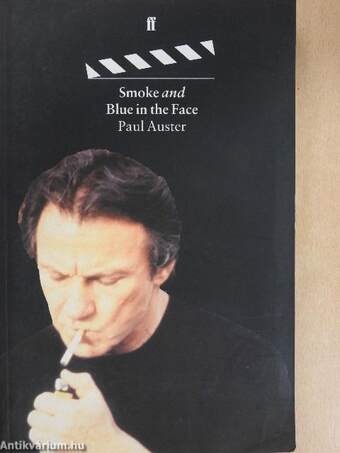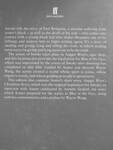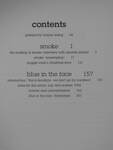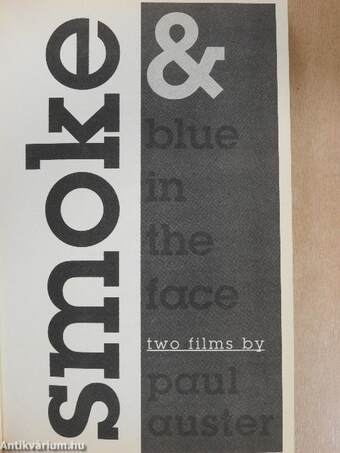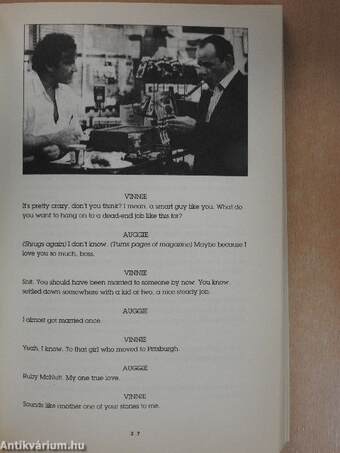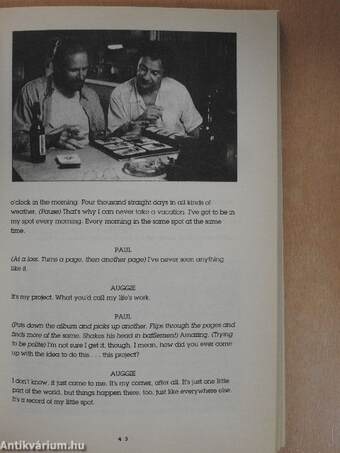1.062.261
kiadvánnyal nyújtjuk Magyarország legnagyobb antikvár könyv-kínálatát

VISSZA
A TETEJÉRE
JAVASLATOKÉszre-
vételek
Smoke & Blue in the Face
Two films
| Kiadó: | Faber and Faber Ltd |
|---|---|
| Kiadás helye: | London |
| Kiadás éve: | |
| Kötés típusa: | Ragasztott papírkötés |
| Oldalszám: | 284 oldal |
| Sorozatcím: | |
| Kötetszám: | |
| Nyelv: | Angol |
| Méret: | 23 cm x 15 cm |
| ISBN: | 0-571-17569-4 |
| Megjegyzés: | Fekete-fehér fotókkal. |
naponta értesítjük a beérkező friss
kiadványokról
naponta értesítjük a beérkező friss
kiadványokról
Fülszöveg
m
n
faberandfaber
Smoke tells the story of Paul Benjamin, a novelist suffering from
writer's block - as well as the death of his wife - who comes into
contact with a young black kid who shakes Benjamin out of his
lethargy and inspires him to begin writing again. It's a story of
stealing and giving, lying and telling the truth, in which stealing
turns out to be giving and lying turns out to be the truth.
The action of Smoke takes place in Auggie Wren's cigar shop,
and this location also provides the focal point for Blue in the Face,
which was improvised by the actors of Smoke after shooting was
completed on that film. Guided by Auster and director Wayne
Wang, the actors created a world whose spirit is comic, whose
engine is words, and whose guiding principle is spontaneity.
This edition also contains Auster's short story, Auggie Wrens
Christmas Story, which was the original inspiration for Smoke; an
interview with Auster conducted by Annette Insdorf; the notes... Tovább
Fülszöveg
m
n
faberandfaber
Smoke tells the story of Paul Benjamin, a novelist suffering from
writer's block - as well as the death of his wife - who comes into
contact with a young black kid who shakes Benjamin out of his
lethargy and inspires him to begin writing again. It's a story of
stealing and giving, lying and telling the truth, in which stealing
turns out to be giving and lying turns out to be the truth.
The action of Smoke takes place in Auggie Wren's cigar shop,
and this location also provides the focal point for Blue in the Face,
which was improvised by the actors of Smoke after shooting was
completed on that film. Guided by Auster and director Wayne
Wang, the actors created a world whose spirit is comic, whose
engine is words, and whose guiding principle is spontaneity.
This edition also contains Auster's short story, Auggie Wrens
Christmas Story, which was the original inspiration for Smoke; an
interview with Auster conducted by Annette Insdorf; the notes
which Auster prepared for the actors in Blue in the Face, along
with his commentaries; and a preface by Wayne Wang. Vissza
Témakörök
- Idegennyelv > Idegennyelvű könyvek > Angol > Művészetek > Film
- Művészetek > Film > Interjúk, vallomások
- Művészetek > Film > Filmforgatókönyvek > Irodalmi
- Művészetek > Film > Filmforgatókönyvek > Külföldi
- Művészetek > Film > Idegen nyelv > Angol
- Művészetek > Film > Műfajok > Közönségfilm > Játékfilm
Paul Auster
Paul Auster műveinek az Antikvarium.hu-n kapható vagy előjegyezhető listáját itt tekintheti meg: Paul Auster könyvek, művekMegvásárolható példányok
Nincs megvásárolható példány
A könyv összes megrendelhető példánya elfogyott. Ha kívánja, előjegyezheti a könyvet, és amint a könyv egy újabb példánya elérhető lesz, értesítjük.



